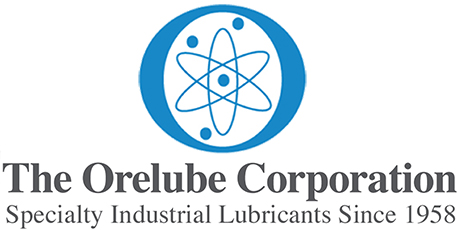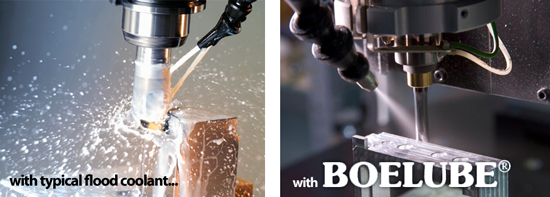BOELUBE MQL

MQL or Minimum Quantity Lubrication can be described as a process by which a minimal quantity of high efficiency lubricant is continuously applied to the interface of the machine tool and workpiece during the machining operation.
In the near dry machining or MQL process, BOELUBE® Liquid can be delivered as fine droplets or spray through one or more nozzles positioned accordingly around the cutting tool. Using a coaxial supply of compressed air and lubricant to the nozzle, the nozzle directs BOELUBE® lubricant droplets in the compressed air directly to the cutting edge. The compressed air will help move chips from the tool cutting edge as the fine lubricant droplets form a thin film at the point of contact to reduce friction between the chip, tool, and workpiece.
The MQL processes using BOELUBE® requires continual reapplication of lubricant to the tool cutting edge and wear surfaces. This can be accomplished externally on shallow drilling, reaming and tapping operations, on milling cutters, and on band and circular saws.
Typical BOELUBE® Liquid usage is about 1 fluid ounce (30 ml) or less per hour of machining time, best determined by application and workpiece composition. Because minimal quantities are used and consumed for the most part in the machining process, BOELUBE® Liquid produces near dry workpieces and chips.
Advantages / Benefits
Historically, the metalworking industry has used metalworking fluids by flood application in machining operations. But because the costs associated with use, management, and disposal of flood coolants has risen over the years, in part due to increasing federal, state, and local regulations aimed at worker safety and fluid disposal, there has been a growing trend to utilize methods requiring less metalworking fluid to reduce cost, protect the environment, and improve and protect worker health, without sacrificing productivity and quality.
Cost savings using BOELUBE® are derived through longer tool life, better surface finish, increased productivity, reduction in lubricant usage and subsequent cleaning and disposal costs, reduced environmental impact, improved housekeeping, and easier chip handling and recycling.
On a comparative basis, near dry machining or MQL can yield longer tool life than machining with flood coolant. The lubricity of BOELUBE® that is applied in small quantities is greater than that of high volume, water based flood coolant. Chip removal can be enhanced because a chip saturated in coolant can acquire both added weight and adhesion that make it more difficult to move away.
BOELUBE® Lubrication Technology
High friction generates heat, which in the case of metalworking, shortens tool life and affects surface finish. When the lubricant film is insufficient to protect metal surfaces, wear or material loss occurs.
BOELUBE® is a technologically advanced lubricant that significantly reduces friction (one of the major elements in generating heat during the material removal process).
BOELUBE® lubricant molecules are polar structures which have a preferential affinity for and orientation on the surface so that a more closely packed arrangement can be achieved. Boundary lubrication is a regime where film thickness between contacting surfaces is only a few molecules thick. BOELUBE® lubricant molecules function by adsorbing on the metal surface imparting high film strength, lubricity and reduction in wear (or material loss).
BOELUBE® Development & Application
One of the earlier uses of BOELUBE® MQL was in aircraft manufacturing. Freon® gas was used in three distinct areas of the riveting process – drilling, rivet insertion, and rivet-head milling.
Because of the undesirable effects of Freon® gas on the ozone layer, Boeing manufacturing research and development engineers introduced an alternative method using BOELUBE® lubricant compositions to efficiently lubricate and cool tools by preventing heat buildup, while greatly reducing the reworking after drilling that had been necessary with Freon® because of exit burrs, oversized holes, and a rough finish on the inside surface of the holes.
It was shown that the application of minimal quantities of BOELUBE® lubricant could reduce friction, speed production, increase tool life, and improve surface finish and hole quality in a number of machining operations.
BOELUBE® lubricants have been widely used in drilling, reaming, and coldworking of fastener holes in aircraft wing skins, installation of wedge-head lock bolts, lubrication of hand drills, and on machinery that automatically drill rivet holes and install rivets on large sections of airplanes.
BOELUBE® lubricants are widely used in the operation of portable positive feed drills.
BOELUBE® lubricants can also be delivered continually through tools with internal channels directly to the cutting edge in drilling, reaming, tapping, and milling applications.
Manufactured from personal care ingredients, BOELUBE® lubricants are worker friendly, dermal non-irritant and biodegradable.
BOELUBE® lubricants are non-corrosive, non-flammable, chemically stable, have indefinite shelf life, and free of halogens, sulfur, phosphorus, silicone, petroleum or paraffin wax.
BOELUBE® provides a high degree of worker safety, and presents a safe effective method to machine various types of materials without special handling, fluid recycling or typical disposal issues.
BOELUBE® is most effective when applied minimally. Less fluid, friction and heat . . . with BOELUBE® MQL, less is more!

